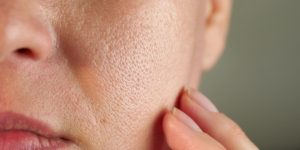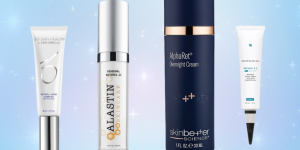Free Shipping Over $100
Free Samples With Every Purchase
Auto Replenishment Available
Authorized Reseller
Combination Skin Care: Best Routine & Products

Caring for combination skin may be the most challenging of all the other skin types, including sensitive skin. People with combination skin have areas that are dry and oily or skin that may fluctuate between being dry or oily. With proper skincare products and a consistent routine, those with combination skin can still achieve healthy, balanced skin. In this blog, our trusted DermSkincare dermatology team provides information to help patients better understand combination skin as well as recommending some go-to products to develop an effective skincare routine for combination skin.
Understanding Combination Skin
People with combination skin may have areas of dryness and oiliness, or they may notice skin changing from dry to oily due to weather shifts, hormone fluctuations, increased stress, or any number of other variables occur. In combination skin, the part of the face called the T zone is most often where signs of combination skin are noticed. The T zone is the area that includes the forehead, bridge of the nose, and the chin. Combination skin often means the T zone area is oily, but the rest of the skin is dry. Not sure that you have combination skin? Consider your answers to the following questions:
- • Does skin on your T zone often look shiny?
- • Do you frequently develop pimples, especially in the T zone?
- • Do you have large, visible pores?
- • Do you suffer from dandruff?
- • Do you have patchy areas of dry, flaky skin?
- • Does your skin’s oiliness or dryness change throughout the year?
If you answered yes to any of these questions, you may have combination skin. For most people, combination skin is genetic. They’re born with it, and it’s not avoidable. However, others develop combination skin due to use of the wrong skincare products, frequent flareups in chronic skin conditions, and other forms of skin damage, including sunburns.
Building an Effective Skincare Routine for Combination Skin
Skincare routines for combination skin are similar to those for sensitive skin types since it’s best to avoid fragrances, dyes, and other harsh ingredients that dry, damage, and irritate combination skin. Because flaky, dry skin cells can get trapped in the oily areas of combination skin and clog pores, it’s also beneficial to choose products that are marketed as noncomedogenic. That means they won’t clog pores. For combination skin, the most important skincare elements are cleansing and moisturizing. We’ll explore those in greater detail over the next two sections.
Cleansing Tips for Combination Skin
Cleansing combination skin presents a unique set of challenges. You want to choose a product that decreases oiliness, but those options irritate dry skin. Products designed for dry skin leave oily areas feeling greasy. When you’re choosing a cleanser for combination skin, it’s important to consider the following factors:
- • Look for a gentle, oil-free, water-based cleansing product without unnecessary fragrances or dyes.
- • Instead of scrubbing away makeup, consider double washing. Use a non-comedogenic makeup remover to dissolve away cosmetics. Then, follow up with your regular cleanser.
- • Exfoliate gently. Rather than harsh, physical exfoliants like sugar scrubs, use a chemical exfoliation agent like salicylic or glycolic acid.
- • Don’t skip toner. Many people aren’t sure how to incorporate toner, but it’s essential to balances skin’s pH levels. For combination skin, toner works to prevent irritation and reduce oiliness.
- • Don’t over wash. Only cleanse your face twice a day or if your skin is dirty or excessively sweaty.
Moisturizing and Treating Combination Skin
Applying moisturizer is one of the main differences for combination skincare routines. This is possibly the biggest hassle. People with combination skin may need to apply two moisturizers at least once a day. Specifically, they should use a lightweight moisturizer for their whole face. Then, apply a thicker moisturizer to the dry patches of skin. This can be done in the morning, evening, or both depending on your specific skincare needs.
Recommended Products for Combination Skin
Less is more when it comes to caring for combination skin. Choosing a few, high-quality skincare products and using them consistently is the best way to keep skin healthy. Below, we’ll outline morning and evening skincare routines and highlight some of the go-to dermatologist-recommended skincare products for combination skin.
Morning Skincare Routine for Combination Skin
- • Cleansing – ALASTIN Skincare Gentle Cleanser is a rich cleanser that’s safe even for sensitive skin. The self-foaming product deep cleans pores and removes oil without drying skin.

- • Toner – Epionce Purifying Toner is a high-quality, easy to apply toner. Simply spray it on clean skin and allow to dry. This toner delivers a deep clean into pores and improves pH balance.
- • Serums – this step is an ideal place to incorporate ingredients that benefit your dry or oily skin, address chronic skin conditions, clear pores, and protect skin against environmental aggressors. A dermatologist can help you find the best option to achieve your unique needs. MD Skin Essentials Fortify combines vitamins C and E with ferulic acid to protect against environmental aggressors, including sun damage. This gentle product strengthens skin and clears up blemishes without drying.
- • Moisturizer – skinbetter Science Hydration Boosting Cream offers an all-day skin hydrating solution. It’s ideal for combination skin. The easily absorbed cream delivers immediate hydration and soothes dry skin without making oily areas greasy. Throughout the day, skinbetter Science Hydration Boosting Cream continues to attract moisture to skin’s surface to keep it hydrated.

- • Sunscreen – EltaMD UV Sheer Broad-Spectrum SPF 50+ is a lightweight, easily-absorbed sunscreen that prevents damage from UVA and UVB rays. Designed specifically for combination and oily skin, this sunblock can be fully absorbed without clogging pores.
Evening Skincare Routine for Combination Skin
- • Cleansing – use a gentle makeup remover as needed and follow up with ALASTIN Skincare Gentle Cleanser.
- • Toner – apply the Epionce Purifying Toner and allow to dry.
- • Retinol – use SkinCeuticals Retinol 0.3 then build up to SkinCeuticals Retinol 0.5 to allow your skin to increase in tolerance to the potentially irritating retinol. The time release retinol also reduces skin irritation.

- • Serum – you don’t necessarily need another serum for your nighttime routine, but if you’re looking to heal and nourish skin overnight, ISDIN Melatonik Overnight Recovery Serum is just what you need.
- • Moisturizer – EltaMD PM Therapy Facial Moisturizer is a fragrance and paraben-free moisturizer. It has ceramides to repair skin’s natural protective barrier and improve moisture retention paired with hyaluronic acid to draw moisture to the skin.
Avoiding Common Mistakes
If you want to achieve healthy combination skin, avoid the following common skincare mistakes:
- • Inconsistent skincare – the best way to maximize the results of your skincare is to be consistent with your morning and evening routine to allow the products to work properly.
- • Relying on products only for oily or dry skin – as the name indicates, combination skin has characteristics of both oily and dry skin. However, people have a tendency to use products that are just for oily or dry skin, which means that only part of their skin is getting the care it needs.
- • Over-exfoliating – the dry areas for those with combination skin type may be flaky or have a different texture than the balanced or oily areas. This leads many people to exfoliating to
 remove dry skin. Unfortunately, many end up over-exfoliating, which only irritates the already dry skin as well as the healthy areas of skin.
remove dry skin. Unfortunately, many end up over-exfoliating, which only irritates the already dry skin as well as the healthy areas of skin. - • Using too many products – there’s seemingly a skincare product for every possible need, and combination skin can present a wide range of needs. However, using a product for every single combination skin characteristic you notice will likely just lead to skin irritation and make the products you’re using less effective. Develop a good routine with your dermatologist and stick with it!
Managing Combination Skin: Lifestyle Tips
In addition to directly caring for your skin, there are some lifestyle factors that indirectly impact the health and appearance of combination skin. Some important lifestyle factors you should keep in mind for healthy skin include:
- • Eat a nutrient-rich diet – there’s no shaming here. We believe everyone should eat what they enjoy and what helps them feel satisfied, but it’s also important to consume foods that provide the nutrients your body needs to repair and replace cells, including skin cells.
- • Drink water – when the body lacks the water it needs to perform essential functions, you’re much more likely to notice dry patches of skin.
- • Get enough sleep – our body heals itself as we sleep, and that includes repairing skin. Getting enough sleep ensures overall health as well as leaving skin looking brighter and more refreshed.
- • Exercise – regular exercise improves circulation to keep skin looking its best as well as promoting healing and rejuvenation.
- • Alleviate stress – minimize sources of stress in your life as much as possible and find ways to rest and relax to alleviate stress. When we experience stress, our body releases the hormone cortisol, which is connected with inflammation, leading to numerous skin health concerns and worsening others.
- • Limit sun exposure – the less time you spend outdoors during peak hours from 10 am to 4 pm is always better. When exposed to the sun’s damaging UVA and UVB rays, make sure to apply sunscreen.
Personalize Your Skincare Routine for Combination Skin
While the dermatologist-recommended products explored in this blog and available from Derm Skincare have been carefully evaluated for efficacy and received the stamp of approval from our professionals, no product, treatment, or skincare routine is right for everyone. A dermatologist can help you develop a daily routine with the right products for combination skin while also helping you meet your needs and address individual skin health concerns. If you’d like to talk to one of our trusted dermatologists, you can reach out to them at U.S. Dermatology Partners.
Explore Our Dermatologist-Recommended Skincare Products
If you’re interested in learning more about our high-quality skincare products, we hope you’ll take some time to explore all that DermSkincare has to offer. You can also check out our blog regularly for product recommendations and skincare tips from our dermatology experts.


















